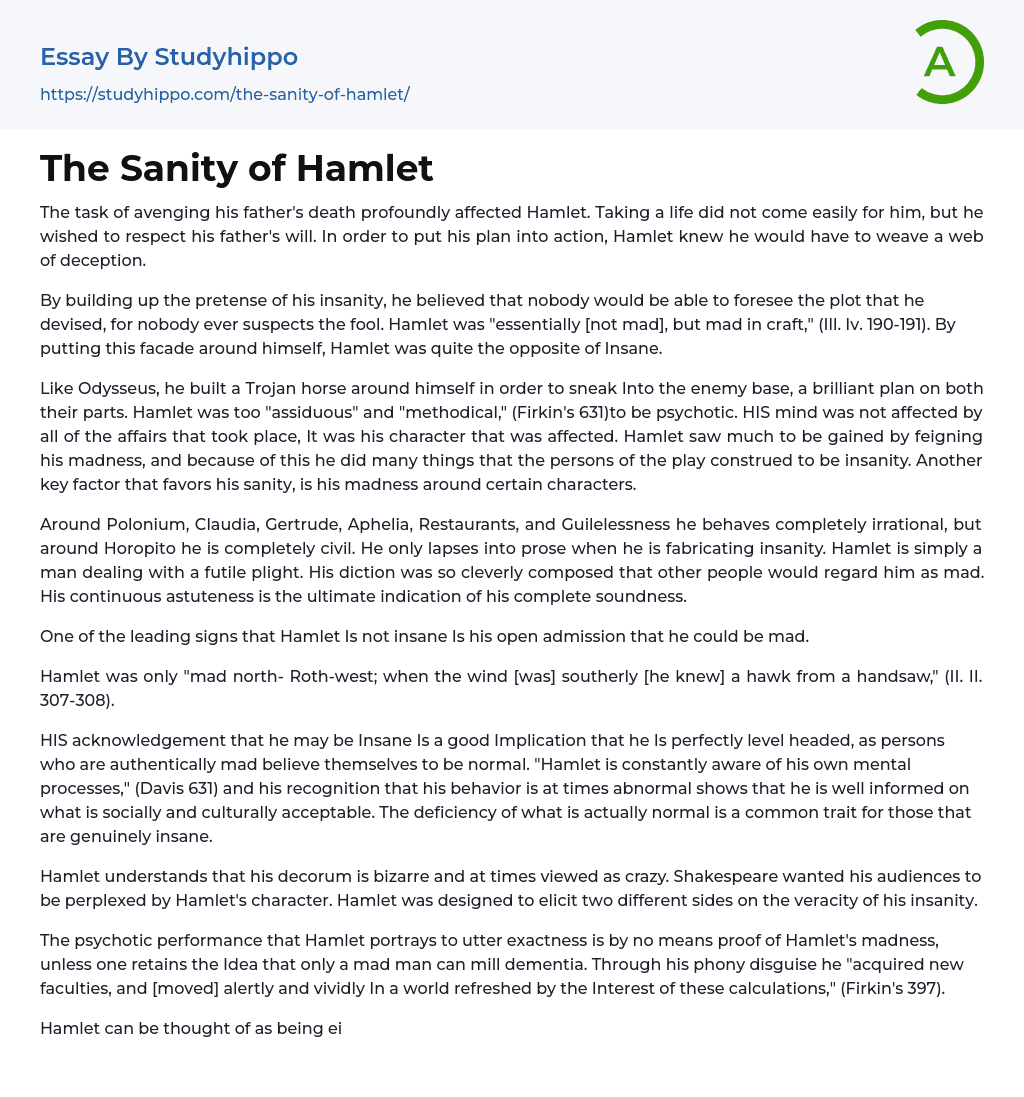Hamlet's mission to avenge his father's death deeply impacted him, and he wished to honor his father's wishes. To put his plan into action, Hamlet had to employ deception. He pretended to be insane, believing that no one would suspect his true intentions. As stated in Ill.Iv.190-191, Hamlet was "essentially [not mad], but mad in craft." With his facade of madness, he was unlike a person who was truly insane.
Resembling Odysseus, Hamlet devised a brilliant plan by building a Trojan horse around himself to get into the enemy's base. His mental state was not psychotic. He was "assiduous" and "methodical," according to Firkin's 631. Hamlet's character was affected by the events, not his mind. Although he appeared insane to other characters of the play, Hamlet saw the benefits of pretending to be mad and behaved irrationally only aroun
...d certain individuals like Polonium, Claudia, Gertrude, Aphelia, Restaurants, and Guilelessness. However, he acted civilly around Horopito, and his lapses into prose only occur when he fabricates insanity. Essentially, Hamlet was just a man dealing with an impossible situation and used clever language that others perceived as madness.
Hamlet's continuous shrewdness is the ultimate indication of his complete soundness, as evidenced by his open admission that he could be mad. In fact, he claims to be only "mad north- Roth-west; when the wind [was] southerly [he knew] a hawk from a handsaw," indicating that he is constantly aware of his own mental processes and well-informed on what is socially and culturally acceptable. Shakespeare designed Hamlet to elicit two different sides on the veracity of his insanity, with the deficiency of what is actually normal being a common
trait for those that are genuinely insane. Nevertheless, Hamlet's acknowledgement that he may be insane is a good implication that he is perfectly level-headed, as those who are authentically mad believe themselves to be normal. While he understands that his decorum may be viewed as bizarre or crazy, his recognition of this fact shows his sanity. Through his phony disguise, Hamlet acquires new faculties and moves alertly and vividly in a world refreshed by the interest of these calculations. Thus, Hamlet can be thought of as being either sane, insane, or a combination of both.The reason for the uncertainty surrounding Hamlet's mental state is due to differing viewpoints on what constitutes sanity. Shakespeare distinguished between real and feigned madness in Hamlet and Ophelia's characters, both of whom experienced the loss of their father and exhibited behavior that was considered mad. However, only one is believed to have truly been insane. Throughout the play, a contrast between Hamlet's fabricated madness and Ophelia's more sincere language is presented. While Hamlet's behavior may seem deeply psychological, it is ultimately a facade used to deal with an impossible situation. Despite his occasional periods of animation and excitement, his sorrow and inner turmoil are understandable as he tries to rectify the wrongs happening around him. Therefore, Hamlet's actions should not be seen as purely his own, but rather a strategy to cope with his circumstances.Despite appearing impetuous and irrational, Hamlet's actions are actually part of a larger plot to serve justice for his father. He tests the guilt of his uncle before proceeding with his scheme in a levelheaded manner, realizing that he may have been deceived by a potentially
malicious ghost. Hamlet's intricate plan involves using a play to expose his uncle's guilt, demonstrating his logical and precise thinking. Although his "antic disposition" may confuse others, Hamlet's true sanity is apparent in his careful planning and execution. He only feigns madness when necessary to deceive his enemies and achieve his goals.
- Prince Hamlet essays
- Hamlet Madness essays
- Learning Disability essays
- Bipolar Disorder essays
- Dyslexia essays
- Major Depressive Disorder essays
- Mental Disorder essays
- Adhd essays
- Anxiety essays
- Depression essays
- Psychosis essays
- Schizophrenia essays
- Antisocial Personality Disorder essays
- Stress essays
- Suicide essays
- Mental Illness essays
- Depression And Anxiety essays
- Insanity essays
- Tension essays
- Suicide Prevention essays
- A Doll's House essays
- A Midsummer Night's Dream essays
- A raisin in the sun essays
- A Streetcar Named Desire essays
- An Inspector Calls essays
- Death of a salesman essays
- Everyman essays
- Fences essays
- Hamlet essays
- Hedda Gabler essays
- Iago essays
- King Lear essays
- Macbeth essays
- Much ado about nothing essays
- Oedipus Rex essays
- Oedipus The King essays
- Othello essays
- Pygmalion essays
- Romeo And Juliet essays
- Tartuffe essays
- The glass menagerie essays
- The Importance of Being Earnest essays
- The Merchant Of Venice essays
- The Taming of The Shrew essays
- Twelfth Night essays
- Waiting For Godot essays
- Abnormal Psychology essays
- Abraham Maslow essays
- Attachment Theory essays
- Authority essays




